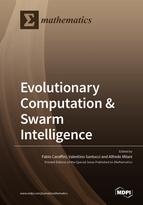Evolutionary Computation & Swarm Intelligence
A special issue of Mathematics (ISSN 2227-7390). This special issue belongs to the section "Computational and Applied Mathematics".
Deadline for manuscript submissions: closed (30 April 2020) | Viewed by 28036
Special Issue Editors
Interests: evolutionary computation; swarm intelligence; computational intelligence; differential evolution; memetic computing
Special Issues, Collections and Topics in MDPI journals
Interests: natural language processing; evolutionary computation; computational optimization
Special Issues, Collections and Topics in MDPI journals
Interests: online evolutionary algorithms; metaheuristic for combinatorial optimization; discrete differential evolution; semantic proximity measures; planning agents and complex network dynamics
Special Issues, Collections and Topics in MDPI journals
Special Issue Information
Dear Colleagues,
The vast majority of real-world problems can be expressed as an optimisation task by formulating an objective function, also known as cost or fitness function. The most logical methods to optimise such a function when (1) an analytical expression is not available; (2) mathematical hypotheses do not hold; and (3) the dimensionality of the problem or stringent real-time requirements make it infeasible to find an exact solution mathematically; are from the field of Evolutionary Computation (EC) and Swarm Intelligence (SI). The latter are broad and still growing subjects in Computer Science that studies metaheuristic approaches, i.e., those approaches which do not make any assumption on the problem to function, inspired from natural phenomena as, in the first place, the evolution process and the collaborative behaviours of groups of animals and communities respectively. State-of-the-art EC and SI frameworks are the genetic algorithm (GA), the evolution strategy (ES), differential evolution (DE), particle swarm optimisation (PSO), bacterial foraging optimisation (BFO), ant colony optimisation (ACO) and the memetic algorithm (MA). The literature is abundant with several other approaches which share a common goal: to find a suboptimal solution of satisfactory quality by alternating explorative searches to exploitative ones.
These optimisation approaches have shown to be flexible, robust, and are thus often referred to as general-purpose or black-box optimisation algorithms. Their success in dealing with several complex problems, e.g., in engineering, economy, or telecommunication, have made them very popular, and they are widely used by practitioners.
However, it is clear—from the No Free Lunch Theorem (NFLT)—that to achieve high-quality solutions, general-purpose methods either require a thorough fine tuning or some sort of self-adaptive capability to become more specialised in the problem at hand. Furthermore, the also state-of-the-art optimisation framework carries flaws for which an easy fix is yet to come (e.g., premature convergence, stagnation, structural bias, lack of self-adaptivity to the specific problem, curse of dimensionality).
In this light, we invite the research community to submit their original contribution to address several challenging aspects in EC and SI, and we welcome studies investigating metaheuristics for optimisation from both the theoretical and the applied side, regardless of the nature of the problem (single-objective, multiobjective, dynamic, etc.). Authors are encouraged to submit their formal and technically sound manuscripts to cover (but not be limited to) the following aspects:
- Algorithmic behaviour and performances;
- Tailored algorithmic design for real-world applications;
- Advances in memetic computing;
- Memory-saving and compact optimisation;
- Real-time optimisation;
- Large-scale optimisation.
Dr. Fabio Caraffini
Prof. Dr. Alfredo Milani
Dr. Valentino Santucci
Guest Editor
Manuscript Submission Information
Manuscripts should be submitted online at www.mdpi.com by registering and logging in to this website. Once you are registered, click here to go to the submission form. Manuscripts can be submitted until the deadline. All submissions that pass pre-check are peer-reviewed. Accepted papers will be published continuously in the journal (as soon as accepted) and will be listed together on the special issue website. Research articles, review articles as well as short communications are invited. For planned papers, a title and short abstract (about 100 words) can be sent to the Editorial Office for announcement on this website.
Submitted manuscripts should not have been published previously, nor be under consideration for publication elsewhere (except conference proceedings papers). All manuscripts are thoroughly refereed through a single-blind peer-review process. A guide for authors and other relevant information for submission of manuscripts is available on the Instructions for Authors page. Mathematics is an international peer-reviewed open access semimonthly journal published by MDPI.
Please visit the Instructions for Authors page before submitting a manuscript. The Article Processing Charge (APC) for publication in this open access journal is 2600 CHF (Swiss Francs). Submitted papers should be well formatted and use good English. Authors may use MDPI's English editing service prior to publication or during author revisions.
Keywords
- Algorithmic design
- Large-scale optimisation
- Compact optimisation
- Estimation of distribution algorithms
- Structural bias
- Parameters tuning
- Stagnation
- Premature convergence
- Stagnation
- Benchmarking
- Evolution strategies
- Genetic algorithm
- Genetic programming
- Evolutionary programming
- Memetic algorithms
- Memetic computing
- Hyperheuristics
- Differential evolution
- Particle swarm optimisation
- Ant colony optimisation
- Bacterial foraging optimisation








